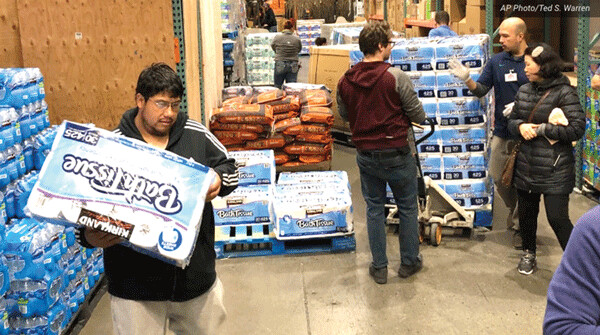News & Articles
Browse all content by date.

The coronavirus pandemic has prompted widespread panic buying, with people stripping stores of hand sanitizers, face masks, toilet paper, hand soap, thermometers, medications — just about anything they fear will soon disappear from the shelves.
Some of that buying is rational, such as making sure you have enough medication to treat chronic medical conditions, for example. But much of it is irrational, such as filling up a shopping cart with toilet paper rolls (and then having a fistfight over it).
As BBC reporter Bryan Lufkin points out in an article on the psychology of panic buying, there are real-world consequences to such behavior, for panic buying “can drive up prices and take essential goods out of the hands of people who need them most (such as face masks for health workers).”
So why do people do it? “Experts say the answer lies in a fear of the unknown, and believing that a dramatic event warrants a dramatic response — even though, in this case, the best response is something as mundane as washing your hands,” writes Lufkin.
A desire for control
As one of those experts, Steven Taylor, a clinical psychologist at the University of British Columbia and author of the book “The Psychology of Pandemics,” told Lufkin, panic buying gives people a sense of control.
“Under circumstances like these, people feel the need to do something that’s proportionate to what they perceive is the level of the crisis,” Taylor said. “We know that washing your hands and practicing coughing hygiene is all you need to do at this point.”
“But for many people, hand-washing seems to be too ordinary,” he added. “This is a dramatic event, therefore a dramatic response is required, so that leads to people throwing money at things in hopes of protecting themselves.”
The need for risk aversion
Experts also say panic buying can be understood as the intersection of three powerful psychological phenomena: herd behavior, loss aversion and regret.
“Herd behaviour explains why we like to buy popular products, or join queues without knowing where they’re going,” writes Australian Broadcasting Corporation (ABC) reporter James Purtill in an article attempting to make sense of why so many people have felt a need to stockpile toilet paper. “Loss aversion is about our fear of missing out — we tend to think it’s better to have extra of something than miss out.”
As David Savage, a behavioral economist at the University of Newcastle told Purtill, “The bigger problem for us is when loss aversion starts to kick in and we start thinking about what would happen if I currently have the opportunity to buy this product and I choose not to, and then down the track, when I am isolated, I run out, that’s when we hit regret.”
“Regret is a really, really powerful motivator. It actually makes us feel way worse than just loss,” he added. “Not only is it missing out on something, it’s missing out on something that I had the choice to fix. That’s a really big kicker, that one.”
How not to become a panic buyer
So, what are the alternatives to panic buying? How do we overcome these strong psychological urges? Here’s what Lufkin concludes after interviewing many experts:
A better plan than panic buying would be to be prepared all year round for possible emergencies or crises. It’s also worth keeping everyone else’s needs in mind as these types of events unfold: stock up on what you and your family need, but avoid the urge to hoard enough supplies to fill a doomsday bunker. Because when individual panic buying plays out collectively, that’s what can lead to price gouging, or low supplies for high-risk individuals who need things like face masks more than the general population does.
It’s also worth noting that quality sources of information are always vital for avoiding rumours and falsities. In Japan, social media rumours erroneously claimed toilet and tissue paper supplies were running low as China would no longer export these products. To stop panic buying, local officials and industry associations had to make statements reminding people that almost all toilet and tissue paper was locally manufactured and there were plenty of supplies.
If you feel the urge to do some panic buying, stop and ask yourself what you’re really afraid of — and then think of the effect that your unnecessary stockpiling will have on others.
As the head of a British food bank told Guardian reporter Robert Booth, “Panic is going to be more dangerous than the virus. Our food parcels are essential for the health of many of the people we support. The food can be a lifeline.”
“Please,” she added, “if you are stockpiling, have a look and say: ‘Am I really going to use this?’ If not, is there someone who needs it more?”
FMI: You’ll find information on useful steps you can take to prepare and prevent your family for the COVID-19 pandemic on the Minnesota Department of Health’s website.
| Tweet |

